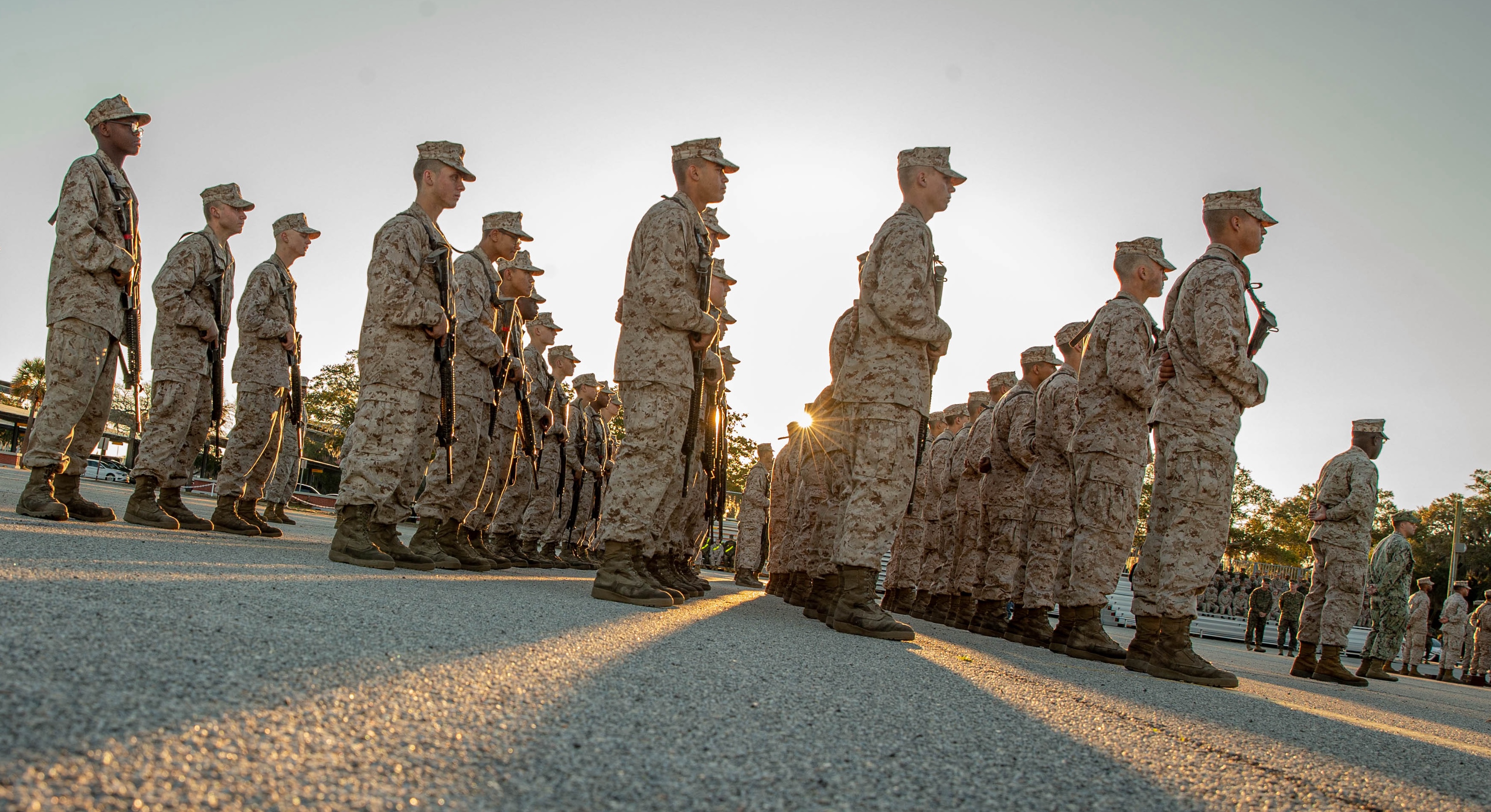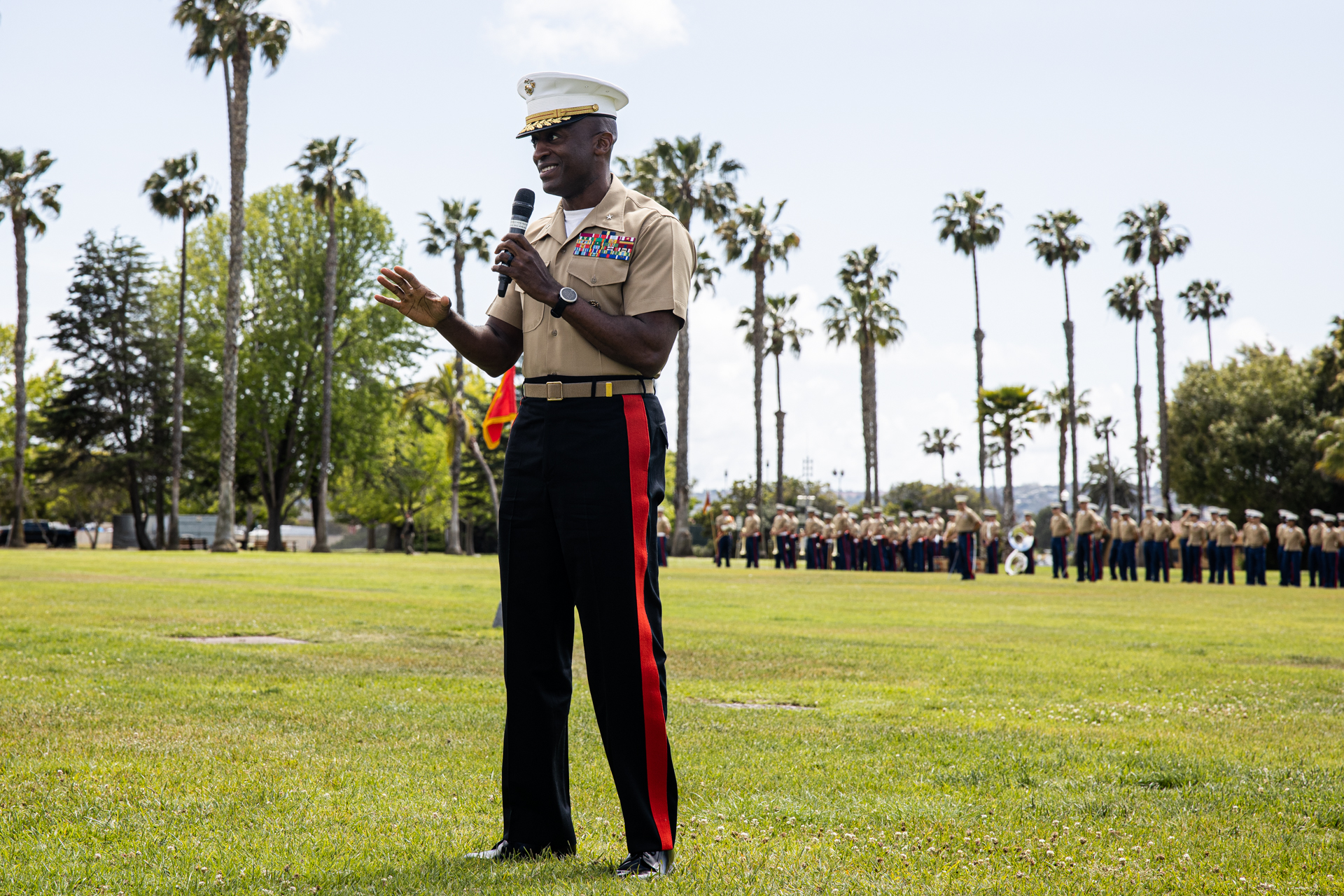
SAN DIEGO – Ask the top two recruiters for the Marine Corps, and they’ll say the key to recruiting is creating a connection with potential recruits.
Even if the person ends up not qualifying for the service, it is that connection, the feeling that someone cares about them that pushes them to want to belong in the Marines.
But that ability to connect to recruits, to get recruits qualified to be sent to boot camp, faces an obstacle in the form of Genesis, the Department of Defense program that screens medical records to find preexisting conditions that might cause a service member to leave early.
Before Genesis, a Marine Corps recruiter could get someone medically qualified in about 30 days and then the potential recruit spent three or four months getting ready for boot camp, Brig. Gen. James Ryans, commanding general, Marine Corps Recruit Depot, Western Recruiting Region, told an audience at the West 2024 conference. Now, after Genesis, it takes three to four months to get someone medically cleared.
The drawn-out process to get medically cleared can affect a recruit’s interest, Ryans said. He shared a story about a Marine who came from a military family who spent four months trying to clear up her medical records because of a procedure done when she was young. It was her persistence that kept her pursuing an enlistment in the Corps, Ryans said.
One of Ryans’ frustrations with Genesis is the lack of data on whether it is accomplishing its mission of screening out medical risk.
The problem with medical qualifications is just one that faces recruiters, for the Marine Corps and the other services.
Competition with the other branches and industry means everyone is fighting for the same small pool of people. Obesity, education levels and previous drug use also limit who might be eligible to serve.
Ryans estimated that it takes about 40 interviews to find four people who can pass the Marine Corps standard on the Armed Services Vocational Aptitude Battery.
The Marine Corps might contact 1.1 million people, Ryans said. From there, 200,000 will make appointments with recruits. Only 89,000 will actually interview with recruiters.
About 31,000 people will be working applicants, Ryans said. It is during this phase when medical qualification comes in.
From that initial 1.1 million people, about 18,000 will enlist or go into the delayed entry program, with accession of about 15,000.
The Marine Corps has not adjusted its recruiting qualifications and kept the same standard physical fitness and test scores. Other branches, such as the Navy, have made adjustments to the lower the level of education or the test score on the ASVAB needed to join. The service also doesn’t offer bonuses.
“And our commandant said their bonus is being a Marine,” Ryans said. “So our whole thing that we’ve been doing and we still continue to do is not shape ourselves to become more attractive, to whom we want, that’s not what we’re doing. We’re saying who we want is who we are.”
There are recruits who ultimately do not pass the Marine Corps standards but pass the ones other services require, he said. So the recruiters may pass off the potential recruits to other services. Ryans said that some Marine Corps recruiters have one recruiting awards because they refer candidates to the other branches.
Recruiting the Few

The Marine Corps has 3,302 recruiters, Assistant Commandant to the Marine Corps Gen. Christopher Mahoney said during a speech in early February.
“These recruiters are the hunter-gatherers,” Mahoney said. “They’re the ones who go out and sell inspiration to the best of America’s youth, across all genders and demographics.”
But Gunnery Sgts. Russell Cowan and Tristan Wiggin are the best Marine Corps recruiters, at least for the past year. Cowan received Recruiter of the Year, while Wiggin earned First Runner-Up, in a Feb. 8 ceremony.
When it comes to recruiting the next Marines, both Cowan and Wiggin said it is important to be honest and transparent.
“There’s no spiel,” Cowan said. “There’s no convincing. It’s just being honest with these kids and actually caring for these kids and setting them up for a bright future.”
There was one person who Cowan thinks of when reflecting on recruiting. He was a graduate of one of the schools that Cowan would go to as part of the recruiting mission. Cowan saw him outside the recruiting station and started a conversation with him.
Cowan learned that the now Marine’s parents had kicked him out. He had tried to enlist before. When Cowan heard his story, he knew how to get him past the finish line. He set him up with the practice ASVAB. He got him lunch. And saw him through the recruiting process.
Recruiting, Cowan said, starts with a conversation.
“It’s as simple as saying hi,” he said.
Part of the job is to create a new image of who recruiters are and tear down misconceptions people might have. Recruiters are not out to trap people into service, he said.
Like Ryans, Cowan and Wiggin said some of the barriers to recruiting are tattoos, passing the ASVAB, criminal history and medical records.
The Marine Corps has some of the strictest tattoo policies, Ryans said. The service does not allow neck tattoos or ones that go past the wrist. Content also matters, and there are people who are let go from the service because of the content of a tattoo, even if it is in an approved area.
For Wiggin, one of the barriers to the ASVAB is its language. He recruits in an area that has a high percentage of native Spanish speakers who struggle with the English test.
Everyone interested in service has different reasons, Wiggin said. Some see it as a way to grow. Others like the challenge. Some seek out the Marine Corps to fill holes they have in their lives, like father figures.
Others want a family or education, Cowan said.
Recruiters have to get out into the public, Wiggin said. People generally do not just walk into the recruiting office. Being in the schools or in the community gives people a chance to see the Marines.
For the recruiters, that means acting professional and demonstrating what it means to be a Marine.
“They see us, and whether they want to say it or not, they do want to be like us, because we do show that professionalism,” Wiggin said.
And often it also means putting in long hours, both recruiters said. But putting in the time and making sure offices are staffed, even over the weekend, can pay off. At least it did in Ryans’ case.
Ryans planned to join the Army, but when he went to the recruiting station, there was no one in the office. But there were Marines just a couple of feet away. Because the Marine Corps recruiters were there, Ryans ended up enlisting in the Marine Corps.
Now he, and recruiters like Cowan and Wiggin, are trying to create the next generation of Marines.





